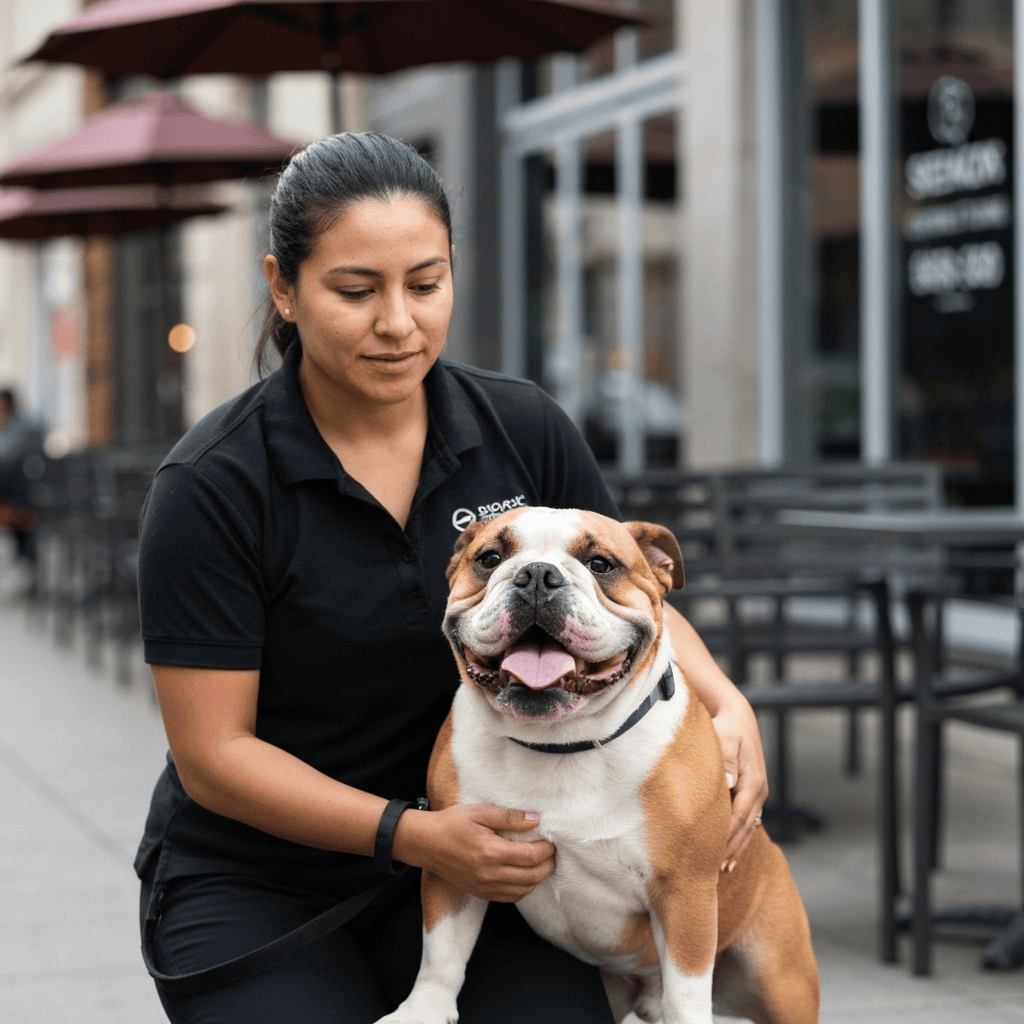Your Complete Guide to Choosing a Dog Trainer in Salisbury
Finding the right dog trainer in Salisbury means understanding how training fits into life here. Your dog needs to handle everything from busy downtown sidewalks to weekend trips to City Park, and that takes practice in real situations.
Whether you’re dealing with a new puppy or working through behavior challenges, good training helps your dog become a confident, well-mannered companion who can enjoy all that Salisbury has to offer. It also keeps you on the right side of local laws while building the bond between you and your dog.
How to Choose the Right Trainer
The best trainers use positive reinforcement methods and can explain exactly how they’ll help your specific dog succeed in your daily routine. You want someone who understands that a training plan for downtown apartment living looks different from one for a house near the university.
When you’re evaluating trainers, ask about their education and certifications. Many respected professionals hold credentials like KPA-CTP, CPDT-KA, or IAABC-CDBC. These aren’t just letters after their name – they represent real education in how dogs learn and how to teach them effectively.
If your dog struggles with reactivity, fear, or aggression, make sure your trainer has specific experience with behavior modification. Look for advanced certifications like CBCC-KA that show they understand complex behavioral issues.
A good trainer will also explain how they’ll gradually move from calm indoor work to more challenging environments like the Riverwalk or busy intersections downtown. They should have a clear plan for keeping your dog successful at each step.
Common Dog Training Methods Explained

Positive reinforcement training works by rewarding behaviors you want to see more often. When your dog sits politely instead of jumping on visitors, they get something good – treats, praise, or play. This builds confidence and makes dogs eager to learn, which is especially helpful in Salisbury’s busy public spaces where your dog needs to make good choices around distractions.
Behavior modification uses techniques like desensitization and counterconditioning to change how your dog feels about specific triggers. If your dog gets anxious around bicycles on the Riverwalk, a trainer might gradually expose them to bikes from a distance while pairing the sight with good things like treats. Over time, bikes become less scary and more predictable.
Puppy training focuses on the basics every young dog needs: socialization, potty training, leash skills, and basic obedience. Good puppy programs include plans for practicing these skills around town, not just in the training room.
Training happens in different formats depending on your needs. In-home dog training works well for house-specific issues or dogs who get overwhelmed in group settings. Group classes provide socialization opportunities and tend to cost less per session. Day training and board and train programs offer intensive help when you need faster progress.
Some trainers also offer specialized programs for therapy dog training or service dog training, though these require specific preparation and evaluation processes.
Salisbury Rules That Affect Training
Wicomico County and the City of Salisbury require dogs to be under control when off your property. This means leashes in public spaces unless you’re in designated off-leash areas like the dog park at City Park.
Maryland law requires current rabies vaccination for all dogs. You can find complete vaccination requirements and guidance at the Maryland Department of Health website.
Wicomico County also requires dog licenses, and you’ll need proof of rabies vaccination to get one. The Wicomico County Humane Society can help you understand the licensing process and requirements.
Excessive barking can lead to nuisance violations, especially in neighborhoods with close-set houses. Training can help with this through enrichment activities, teaching calm greetings, and developing routines that reduce anxiety when dogs are alone.
If your trainer wants to hold sessions in public parks, they may need permission from the property owner. For county properties, check current policies with Wicomico Recreation & Parks before planning outdoor training.
Maryland doesn’t license dog trainers as a profession, but responsible trainers carry liability insurance. Many training facilities and public venues require proof of insurance before allowing trainers to work there.
Average Cost of Dog Training in Salisbury (Updated for 2025)
Training costs vary based on the trainer’s experience, location, and what you’re trying to accomplish. Here’s what most dog owners in the Wicomico County area can expect to pay.
| Service Type | Typical Local Price |
|---|---|
| Group classes, 4 to 6 weeks | $140 – $300 |
| Private lessons, 60 minutes | $85 – $160 per session |
| In-home dog training, 60-90 minutes | $100 – $175 per session |
| Puppy training package, 4-6 visits | $300 – $550 total |
| Day training, per week | $450 – $850 |
| Board and train, 2-4 weeks | $1,800 – $3,500 total |
| Behavior consult, initial | $120 – $200 |
Prices tend to be higher for complex behavior cases, travel to areas outside the city, or premium time slots like evenings and weekends. Many trainers offer package deals, follow-up support through text or video calls, and some provide a free consultation to discuss your goals before you commit.
Questions to Ask a Potential Dog Trainer
- What training methods do you use, and how do you keep sessions positive and stress-free for dogs?
- What certifications or continuing education do you have in dog training and behavior?
- How would you customize a training plan for my dog’s specific needs and our life in Salisbury?
- What training formats do you offer, and which would work best for our situation?
- If my dog has reactivity, fear, or aggression issues, how do you handle those safely?
- What exactly is included in your pricing, and are there additional fees for travel or cancellations?
- Do you carry liability insurance, and can you provide proof?
- How should I practice between sessions, and how will we track progress?
- Would you coordinate with my veterinarian if medication or medical issues might be affecting behavior?
Local Resources for Dog Owners in Salisbury
The Salisbury Dog Park at City Park offers separate areas for small and large dogs, making it a good spot for socialization and off-leash recall practice during quieter times. Early mornings and weekdays tend to be less crowded.
Pemberton Historical Park has trails where leashed dogs can practice walking nicely around wildlife, other people, and new sights and smells. Check current visitor information at Pemberton Historical Park.
WinterPlace Park provides walking paths perfect for leash training and casual exposure to joggers, families, and other dogs. Park rules and updates are available through Wicomico Recreation & Parks.
For longer adventures, Assateague Island National Seashore allows dogs in specific areas where your dog can experience beach environments. Always review current pet policies at the National Park Service website before visiting.
You can find pet policies for Maryland state parks at Maryland DNR. The Wicomico County Humane Society provides licensing help, vaccination information, and lost-and-found services for local pet owners.

Common Questions About Dog Training in Salisbury
How much does in-home dog training cost?
Most trainers in the Salisbury area charge $100 to $175 per in-home session. The price depends on session length, travel distance, and whether you’re working on basic manners or complex behavior issues.
Is in-home dog training worth it?
In-home training makes sense for puppies still learning house rules, families with busy schedules, or dogs with behavior problems that happen specifically at home. When training happens in your actual environment, dogs learn faster because they’re practicing exactly what you need them to do every day.
Can you pay someone to house train your dog?
Yes, trainers can create detailed potty training plans and even provide day training to establish routines quickly. However, house training requires consistency from everyone in your household, so trainers will also coach you on maintaining the schedule and recognizing your dog’s signals.
What is the 3-3-3 rule for dog training?
This guideline suggests new dogs need about 3 days to decompress from stress, 3 weeks to learn household routines, and 3 months to feel completely settled. Training should start gently and gradually increase as your dog adjusts to their new environment.
How long will it take to reach my training goals?
Basic obedience and manners typically take 4 to 8 weeks with daily practice between sessions. Issues like reactivity, separation anxiety, or fear often require several months of consistent behavior modification work. Your trainer should give you realistic timelines based on your specific situation.
What should I bring to group classes?
Bring a flat collar or properly fitted harness, a 6-foot leash (not retractable), high-value treats your dog loves, water, and vaccination records if the facility requires them. Some trainers provide equipment for the first session while you decide what works best for your dog.
What’s the leash law in Salisbury?
Dogs must be under control and leashed in public areas unless you’re inside designated off-leash zones like dog parks. Animal Control enforces leash laws and responds to complaints about dogs running loose or creating nuisances.
Do I need a dog license in Salisbury?
Wicomico County requires dog licenses with proof of current rabies vaccination. The Wicomico County Humane Society can help you understand the process and requirements for getting your dog properly licensed.
What shots does my dog need in Maryland?
Maryland requires rabies vaccination for all dogs. Your veterinarian may recommend additional vaccines based on your dog’s age, health, and lifestyle. Complete statewide vaccination guidance is available at the Maryland Department of Health.
Are dog trainers required to be licensed in Maryland?
No professional license is required for dog trainers in Maryland. Instead, look for education credentials like CPDT-KA or IAABC-CDBC, and always ask for proof of liability insurance.
Where can I practice off-leash recall?
The fenced dog park at City Park works well for recall practice, especially during quieter hours. Everywhere else requires leashes, but you can practice long-line recalls in open fields where park rules allow. Check policies with Wicomico Recreation & Parks before training in county properties.
Which dog parks allow training around Salisbury?
The Salisbury Dog Park at City Park is the main off-leash area where you can work on socialization and recalls. Keep training sessions brief and positive, and always give other dogs and owners plenty of space to enjoy the park too.
What beaches and trails allow dogs for training?
Assateague Island National Seashore allows dogs in designated areas with specific rules posted by the National Park Service. Many Maryland state parks welcome leashed dogs on certain trails – check the comprehensive pet policy at Maryland DNR before planning your trip.
Do trainers need insurance in Maryland?
State law doesn’t require it, but responsible trainers carry general liability insurance to protect themselves and their clients. Training facilities and public venues often require proof of insurance before allowing trainers to work there, so always ask to see current coverage.
Can a trainer help with reactivity in busy downtown areas?
Absolutely, but it takes a systematic approach. Good trainers start with your dog’s current comfort level and gradually work toward busier environments like downtown sidewalks. They’ll teach you how to recognize when your dog is getting overwhelmed and how to keep them calm and focused even with distractions around.
The right training makes all the difference in helping your dog become a confident, well-behaved companion around Salisbury. Look for trainers with solid credentials like KPA-CTP or the science-based CTC, clear methods you’re comfortable with, and realistic expectations about what training can accomplish for your specific situation.
